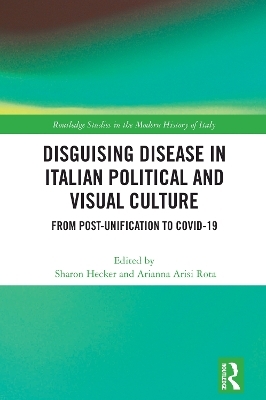
Disguising Disease in Italian Political and Visual Culture
Routledge (Verlag)
978-1-032-46679-8 (ISBN)
The book explores how governments, public opinion, social entities and cultural production have avoided or sublimated contagion during cholera, typhoid, syphilis, malaria, HIV and COVID-19 to impose narratives of the nation’s healthy body in Italy and its colonies. Examples range from a tuberculosis sanatorium in Capri that masked as a luxury hotel and hideaway for queer couples to an obscure but talented professor who found a new cure for syphilis; from denial of disease in governmental actions to sublimated representations in Italian art, literature and films such as Luchino Visconti’s cinematic adaptation of Thomas Mann’s Death in Venice to a sociological study of the need to include fragile figures based on the lessons of COVID-19.
Intended for scholars, students and general readers interested in the history of medicine, political and cultural history, and Italian studies, this volume shows how contagious diseases clash with the official narrative of emerging modernized urban settings and challenge the desire for political and economic stability.
Sharon Hecker is an art historian and curator specializing in Modern and Contemporary Italian art. She is the author of A Moment’s Monument: Medardo Rosso and the International Origins of Modern Sculpture and co-editor of Curating Fascism: Exhibitions and Memory from the Fall of Mussolini to Today. Arianna Arisi Rota is Professor of Contemporary History at the University of Pavia. She specializes in the history of politics and diplomacy in the nineteenth century, with special attention to generations, and memory-building. Her publications include I piccoli cospiratori, Risorgimento, Il cappello dell’imperatore and Profughi.
1. Denying Disease: An Introduction
2. Diseased Bodies in Early Modern Europe: Picturing Plague Victims
3. Experiencing Transnational Health Challenges: The Safety/Commerce Dilemma in Italy’s Long Nineteenth Century
4. Exporting Epidemics: The Cholera of 1910–11 from Southern Italy to Libya—Denial, Causes and Consequences
5. Medical Mistrust and Contagious Disease in the Italian 1860s: Professor Angelo Scarenzio’s Neglected Therapy for Syphilis
6. The Insufficiency of Science: Skepticism, Polemic and Irony Towards Medicine in Nineteenth- and Twentieth-Century Italian Literature
7. “Fever Veiled in Mist”: Denying Contagious Diseases in Modern Italian Visual Arts
8. Masking Female Illness: Tuberculosis in Tigre Reale.
9. The Old, the Frail and the Misinformed: Cholera and Aging in Visconti’s Death in Venice (1971)
10. Tuberculosis, Queerness and Luxury Guests: The Hidden Stories of Capri’s Hotel Quisisana
11. Forgetting or Disguising? HIV/AIDS in the Italian Newspapers in the Twenty-First Century
12. The Italian National Health Service in a Time of Crisis: What Were the Responses for the Most Vulnerable People?
| Erscheinungsdatum | 01.08.2024 |
|---|---|
| Reihe/Serie | Routledge Studies in the Modern History of Italy |
| Zusatzinfo | 1 Tables, black and white; 5 Line drawings, black and white; 26 Halftones, black and white; 31 Illustrations, black and white |
| Verlagsort | London |
| Sprache | englisch |
| Maße | 156 x 234 mm |
| Gewicht | 589 g |
| Themenwelt | Sachbuch/Ratgeber ► Gesundheit / Leben / Psychologie |
| Geisteswissenschaften ► Geschichte ► Regional- / Ländergeschichte | |
| Studium ► Querschnittsbereiche ► Geschichte / Ethik der Medizin | |
| Studium ► Querschnittsbereiche ► Infektiologie / Immunologie | |
| ISBN-10 | 1-032-46679-0 / 1032466790 |
| ISBN-13 | 978-1-032-46679-8 / 9781032466798 |
| Zustand | Neuware |
| Haben Sie eine Frage zum Produkt? |
aus dem Bereich


